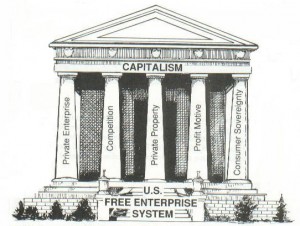 I had an interesting experience speaking to a first year government class. I began the hour by asking the students this question: “What form of government do we have in America?”
I had an interesting experience speaking to a first year government class. I began the hour by asking the students this question: “What form of government do we have in America?”
No response.
“I mean is this an oligarchy, a monarchy, a theocracy…?”
Finally, a young man in front, probably no more than 18 and clearly wishing he weren’t in this class (and in front), offered: “A Capitalist Democracy.”
Now, I could play teacher! “A Capitalist Democracy…interesting….”
Before I could continue a young woman chimed in (the ball was rolling): “We are a Republic!”
“A Republic! “ I repeated (I love when teachers repeat things so as to appear as if they’re leading students down a path).
“What is a Republic?”
Ooops! I’d gone too far. The room was even more silent than it was when empty. No one wanted to venture down that path. I’ve learned over the years that to most people, a “Republic” is nothing more than the thing “for which we stand.”
“If I said that a Republic is a Representative Democracy what would I be saying?”
The young woman started wiggling around and was encouraged a little—
“It would mean that we elect representatives to….represent us in government…”
“And…?” I coaxed.
“And…that is why we are…free?”
“Pretty darned close!” I said. “The people elect representatives to create and vote on legislation in the public’s interest. But, I want to go back to what the young man in front said. He said ‘a Capitalist Democracy.’ Can anyone explain Capitalism?”
The room was now buzzing a little and the young man had more confidence.
He offered: “Capitalism is free enterprise!”

“Yes, indeed! That is correct. But is it a form of government?”
No response. Suddenly another young woman threw her hand in the air—
“No! It’s an economic system. The opposite of Socialism.”
“Well…” I corrected, “Socialism is a form of government but it does control certain economic principles. Capitalism, on the other hand, is an economic system based on the private ownership of production and distribution of goods, facilitated by, as that young man pointed out, a free market. But…a government of the people must hold itself to ethical principles.”
That landed with a thud.
The class was engaged, and the hour was productive, but the young man’s comment stayed with me. To many people this is the land of freedom to attain capital, above and beyond other notions of unalienable rights. Later that week I was in a conversation with someone that I do business with and this person echoed the thought of the young man who said this is a “Capitalist Democracy.” Only he put it in words I hear more often these days: “This is America where our system rewards hard work and success!”
A mistake is being made if we think of our country as having been founded on principles of an economic system and not a system of ethical governance. The mistake is in thinking that the roots of American independence were planted in a paradigm of financial success; a system that has no moral allegiance and does, indeed, reward the hardest working and the strongest, while those who fail…fail.
Today, there is a disconnect in America between why we were created and where we should be heading. Although we were created by original Christians escaping religious persecution in England, they, themselves, became exclusionary as different, predominately Christian sects emerged. Over time the colonies produced Theists, Atheists and Agnostics, as well.
From this theological melting pot, our Founding Fathers had the wisdom and vision to create a great charter; predicated on government that protected religious freedom, freedom of speech and guaranteed a voice and representation to the least powerful among us. It demanded a system of impartial justice.
Nothing in this Charter said, “And we shall be a nation founded by the free market; where justice is governed by margin of profit; and where access to freedom, its benefits and resources is determined by financial success.”
That may sound a little extreme, yet that is how half of America is defining our greatness and what we should be inspired to return to. They view American freedom as an unbridled Free Market, where profit is a moral directive and success is measured by accumulation, rather than the protection of liberty and justice.
America is a nation that endures the complexities of her fight for Freedom and Tolerance; that has risen from conflict to champion human rights; a nation that has proven its sovereignty with its realization of individual freedom and has the capacity to shine as a beacon of justice around the world.
Albeit flawed in the execution of those principles, our government was created to uphold equal rights of citizens and not as a defender of an economic dumpster with no such allegiance.
To my students, my friends and foes- Capitalism (regulated) is the natural and fitting economic model for a free nation, but let’s not let the tail wag the dog. While merchant capitalism gleamed across the American coastline well before our thirst for freedom was realized, that economic principle was welcomed by the theory of governance that emerged from a nation longing to be free…not the other way around.